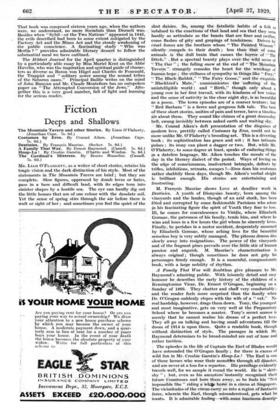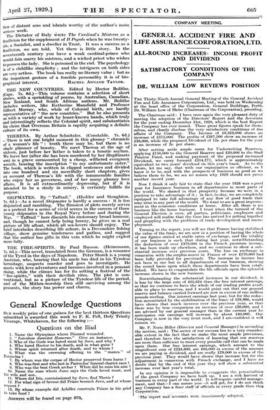Fiction
Deeps and Shallows
The Mountain Tavern and other Stories. By Liam O'Flaherty. (Jonathan Cape. 7s. 6d.) Destinies. By Francois Mauriae. (Seeker. 7s. 6d.) *. LIAM O'FLAirererv, as a writer of short stories, retains his tragic vision and the dark distinction of his style. Most of the statements in The Mountain Tavern are brief ; but they are complete. Slow figures, oppressed by dumb loves or hates, pass in a bare and difficult land, with its edges torn into sinister shapes by a hostile sea. The eye can hardly dig out the little houses that are of one colour with the desolate soil. Yet the sense of spring stirs through the air before there is waft or sight of her ; and sometimes you feel the quiet of the shut daisies. So, among the fatalistic habits of a folk so `subdued to the exactions of that land and sea that they seem hardly as articulate as the beasts that are finer and swifter, come flashes of- pity and gropings of tenderness. Driven by cruel forces are the brothers whom " The Painted Woman" silently .:compels _to their death ; less than that of some
animals . is • the dull brain that causes the _horror. of The 1)itch." But a_spectral beauty plays over: the wild scene of
" The Dar ; the falling snow at the end of " The ]Mountain Tavern'.'_ strangely consoles the heart for the wreckage of human-hope.; the stillness of sympathy in things like "_ The'131ael!Rabbit," " The Fairy Goose," and the exquisite "Blackbird's Mate," . cominunicates the 'Suffering of the unintelligible world-; and " Birth," though . only about a
young cow in hei first travail, with its kindness of low voices and the sense of nativity in the clear night sky, is as beautiful as a poem. • The town episodes are of a coarser texture; but " Red Barbara " is a fierce and gorgeous folk tale. The best of these short stories, unities of pain and terror, have a timeless air about them. They sound lfice chimes of a great doomsday bell, swung invisibly between naked earth and waiting sky.
Mr. Conrad Aiken's deft' preientation of the disguises of Modern love, prettily called Costumes by Eros, could not be
More unlike Mr. O'Flaherty's brooding art._ This is a diverting book ; its sophistication has grace and wit ; it has intimate pulses ; its irony can plant a dagger or two. But, while Mr: O'Flaherty, to some degree at least, speaks of enduring things in a dateless language, Mr. Aiken touches the moods of the day in the literary dialect of the period. Ways of loving on the edge of consciousness, inadvertent betrayals, defeats by trifles, inhibitions, retreats, escapes !—Eros does his costumes rather shabbily these days, though Mr. Aiken's verbal sleight is brilliant enough. His stories are entertaining and frustrating.
M. Francois Mauriac shows Love at deadlier work 14 Destinies. A youth of Dionysiac beauty, born among the
vineyards and the landes, though of an arid stock, has been feted and corrupted by some fashionable Parisians .who adore in his fascinating figure the spirit of Youth they fear to lose.
in, he comes for convalescence to Viridis, where Elizabeth Gormac, the patroness of his family, tends him, and where he wins and loses in a few hours the girl whom he sincerely loves.
Finally; he perishes in a motor accident, desperately mourned
by Elizabeth Gormac, whose aching love for the beautiful senseless boy is very subtly managed. The piteous drama dies
slowly away into resignations. The power of the vineyards
and of the fragrant pines prevails over the little stir of human passion and anguish. M. Mauriac's characterization is always original ; though sometimes he does not grip his personages firmly enough. It is a mournful, compassionate book, with a large nobility of rhythm.
A Family That Was will doubtless give pleasure to Mr. Raymond's admiring public. With leisurely detail and easy humour he, deieribes the early history of the_ children of a Kensingtonian Vicar, Dr. Ernest O'Grogan, beginning on Sunday of 1893. They chatter and chaff very comfortably ; and the reader feels more surprised than the family when Dr. O'Grogan suddenly elopes with the wife of O. _a " vet." N real hardship, however, drags them down. Tony, the youngest and most imaginative, gets on very well at the Preparatory School where he becomes a master. Tony's secret sorrow is merely that he cannot realize his dream of a perfect love. They all go on talking and having small adventures till the doom of 1914 is upon them, Quite a readable book, though without distinction of style. The passages in which Mr. Raymond determines to be broad-minded are out of tone and rather tactless.
The episodes in the life of Captain the Earl of Blades would have astounded the O'Grogan family ; for there is excess of wild fun in Mr. Crosbie Garstin's Houp-La ! The Earl is one of those heroes' who wear their monoZies through all disaster, and are never at a loss for a repartee. His persiflage evidently travels well, for we sample it-round the world. He is " skirt- shy " ; but, even as his ancestors'instantly recognized their future Countesses and bore them away, so he finds his "Not impossible She " riding a *hilly horse in a circus at Singapore. The vicissitudes of the- circus carry us into a region of fantastic farce, wherein the Earl, though misunderstood, gets what he Wants. It is admirable fooling—with-some luminous-descrip- OA of distant seas and islands worthy of the author's more serious work.
The Dictator of Italy wrote The Cardinal's Mistress, as a feuilleton for the supplement of Ii Popolo when he ('as twenty- six, a Socialist, and a dweller in Trent. It was a success as a feuilleton, we are told. Yet there is little story. In the seventeenth century you have a weak cardinal-prince who would fain marry his mistress, and a wicked priest who wishes to possess the lady. She is poisoned in the end. The psychology is of a childlike simplicity ; and the intriguers on both sides are very artless. The book has really no literary value ; but as the impatient gesture of a forcible personality it is of bio-









































 Previous page
Previous page